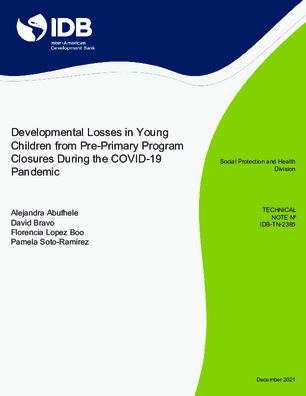Developmental Losses in Young Children from Pre-Primary Program Closures during the COVID-19 Pandemic
Date
Jan 2022
The learning and developmental losses from pre-primary program closures due to COVID-19 may be unprecedented. These disruptions early in life, when the brain is more sensitive to environmental changes, can be long-lasting. Although there is evidence about the effects of school closures on older children, there is currently no evidence on such losses for children in their early years. This paper is among the first to quantify the actual impact of pandemic-related closures on child development, in this case for a sample of young children in Chile, where school and childcare closures lasted for about a year. We use a unique dataset collected face-to-face in December 2020, which includes child development indicators for general development, language development, social-emotional development, and executive function. We are able to use a first difference strategy because Chile has a history of collecting longitudinal data on children as part of their national social policies monitoring strategy. This allows us to construct a valid comparison group from the 2017 longitudinal data. We find adverse impacts on children in 2020 compared to children interviewed in 2017 in most development areas. In particular, nine months after the start of the pandemic, we find a loss in language development of 0.25 SDs. This is equivalent to the impact on a childs language development of having a mother with approximately five years less education. Timely policies are needed to mitigate these enormous losses.




